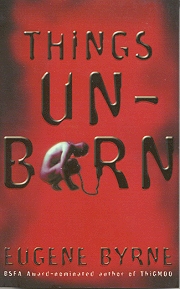

THINGS UNBORNby Eugene ByrneEarthlight0-7434-0911-6420pp/£6.99/April 2001 |
 |
Reviewed by Steven H Silver
It is not surprising that Eugene Byrne’s Things Unborn is reminiscent of Kim Newman’s Anno Dracula. The authors have written several short stories together (Back in the U.S.S.A.) and have been working on a massive alternative history project. While Anno Dracula collected famous vampires and combined them real and fictional characters from the Victorian era, Things Unborn posits a world in which people who have died prematurely throughout history can find a new life following the Atom War of 1962. Unlike Newman’s book, Byrne only uses a handful of historical figures, although several historicals are mentioned throughout the book. The historical figures Byrne has decided to use, notably Scipio Africanus (a former slave, not the Roman general, 1702-20) and John Wilmot, Earl of Rochester (1647-80), are not particularly well-known figures. This gives Byrne latitude to create the characters as needed for the novel. At the same time, he does need to remain true to what is known about their characters in history. As more is known about Rochester than Africanus, this becomes a more difficult task in Rochester’s case. Byrne’s society combines retreads, the resurrected people from earlier times, survivors of the Atom War and hereborns, those born after 1962. The retreads have formed a system of kinship adoption which helps orient new retreads into the society. Although the major plot of Things Unborn is a group of retreads who want to recreate English society as a Puritan utopia, Byrne’s society runs rather smoothly with little conflict caused by the centuries-worth of different attitudes running up against each other. Scipio Africanus is a police inspector who has been assigned a new retread, Guy Boswell, as a ‘prentice. Guy’s recent resurrection allows Byrne to explain the workings of his society, as well as its background, to the reader without seeming to just dump information. He augments these details with flashback sequences featuring a variety of characters, showing various historical times both before and after the Atom War. Africanus and Boswell are trying to solve a murder which seems to revolve around the Society of John Bull, a group of Protestants who are trying to destroy the agreement by which England is governed by a monarchical figurehead (a retread Richard III) and Parliament. At times, the novel resembles a police procedural, but Byrne focuses on his characters and the way the fit into the strange society enough to keep the novel from simply being another procedural.Things Unborn does have a few minor faults. Byrne portrays characters from widely differing periods and beliefs managing to fit into the general mold of society too easily. However, he does try to explain how the characters manage to interact with each other and the new world in which they have found themselves. While his explanations don't always ring entirely true, they make sense within the context of the story.
Although Things Unborn is only Byrne's second solo novel, it demonstrates an ease of plotting and characterization that many more established authors have not managed to acquire. Byrne invites the reader to suspend disbelief for the length of the novel and manages to provide an interesting story which rewards that suspension and makes the reader willing to suspend disbelief for future novels and stories.
